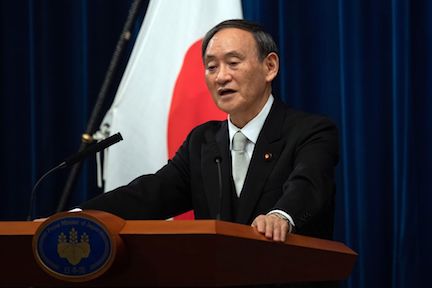US will need Japan more as China tensions rise, Suga aide says
Friction between the U.S. and China means Washington will need Japan more than before, regardless of who wins the presidential election, according to a foreign policy adviser to Prime Minister Yoshihide Suga.
“U.S. relations with Japan and East Asian policies are likely to become relatively more important” as China becomes more powerful, former diplomat Kunihiko Miyake said in an interview Thursday, while the U.S. election result remained unclear. Friction between China and the U.S. won’t dissipate under a new president, because both Democrats and Republicans are in agreement that China is the main strategic rival for the U.S., Miyake added.

Suga must tread a fine line with Japan’s only formal military ally, the U.S., and its biggest trade partner, China. Democrat Joe Biden, a past proponent of engagement with Beijing, has adopted a more critical tone during the campaign and pledged to enlist allies to a coordinated effort to check China’s rise. Republican Donald Trump has been more assertive with China than any U.S. president in decades, slapping tariffs on goods and moving to restrict its access to key technologies.
Max Baucus, a Democratic former senator who served as U.S. ambassador to China during the Obama administration, said it’s important for Chinese people to see America standing up for its historical values, such as respect for human rights and democracy. “The more America gets belligerent toward China in the Senate or in the administration and tries to put China down, the more that strengthens the hands of hawks in China,” he told Bloomberg TV.
Domestic opposition would make it hard for Biden to rejoin the Trans-Pacific Partnership abandoned by Trump, Miyake said, emphasizing that his views didn’t represent those of the Japanese government. While a Biden administration would be unlikely to push for the four-fold increase in host-nation support for U.S. troops in Japan that Trump sought, it might nonetheless press Tokyo to pay more.
Although some in Suga’s ruling Liberal Democratic Party have urged a tougher line on China, his government has avoided any actions that might throw relations off track. China may try to improve ties with Japan, as its feud with the U.S. drags on, Miyake said.
Unlike his long-serving predecessor, Shinzo Abe, who spent hours on the golf course with Trump, Suga has scant experience of diplomacy. Miyake said that may mean officials at the Foreign Ministry and the U.S. State Department gain more importance as the channel for communications.
Suga is thinking of visiting the U.S. in January, the Mainichi newspaper reported, while Chinese Foreign Minister Wang Yi may make a trip to Japan as soon as this month, according to the Yomiuri newspaper.
Evan Medeiros, a Georgetown University Asian studies professor who served in the Obama administration as an adviser on Asia-Pacific affairs, said it’s uncertain how much U.S.-China relations can be salvaged.
If Biden wins, “it will be a challenge to recalibrate the relationship because he will have a conservative Republican Congress that is constantly using China to show his weakness on national security issues,” Medeiros told Bloomberg TV.
Similar Stories
December CNBC/NRF retail monitor results show strong growth boosted by final Thanksgiving weekend days
Retail sales jumped strongly in December, boosted in part by two busy holiday shopping days during Thanksgiving weekend falling in the final month of the year, according to the CNBC/NRF…
View ArticleNAW presents Dirk Van Dongen Lifetime Achievement Award to Bergman, CEO of Henry Schein, Inc.
At the 2025 NAW Executive Summit Gala on January 28 in Washington, D.C.
View Article
St. Louis region’s chemical industry welcomes new investment
View Article
Navigating compliance: Adapting to changing Customs regulations in global supply chains
View Article
December 2024 U.S. Transportation Sector Unemployment (4.3%) Was the Same As the December 2023 Level (4.3%) And Above the Pre-Pandemic December 2019 Level (2.8%)
View ArticleDP World appoints Jason Haith as Vice President of Freight Forwarding for U.S. and Mexico
DP World, a global leader in logistics and supply chain solutions, has announced the appointment of Jason Haith as Vice President, Commercial Freight Forwarding – U.S. and Mexico, effective immediately.…
View ArticleGet the most up-to-date trending news!
SubscribeIndustry updates and weekly newsletter direct to your inbox!





